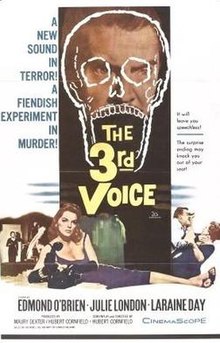The 3rd Voice
| The 3rd Voice | |
|---|---|
 Theatrical release poster | |
| Directed by | Hubert Cornfield |
| Written by | Hubert Cornfield |
| Based on | All the Way by Charles Williams |
| Produced by | Hubert Cornfield Maury Dexter |
| Starring | Edmond O'Brien Julie London Laraine Day |
| Cinematography | Ernest Haller |
| Edited by | John A. Bushelman |
| Music by | Johnny Mandel |
Production company | |
| Distributed by | 20th Century Fox |
Release date |
|
Running time | 79 minutes |
| Country | United States |
| Languages | English Spanish |
The 3rd Voice (also known as The Third Voice) is a 1960 American neo noir thriller crime drama film directed and written by Hubert Cornfield, who also produced the film with Maury Dexter. It is based on the novel All the Way by Charles Williams and stars Edmond O'Brien, Laraine Day (in her final film), and Julie London.[1][2]
Plot
[edit]The Man is the accomplice of Marian Forbes, the spurned mistress of a tycoon. She coaches The Man in impersonating the voice and appearance and habits of the intended victim. The Man begins his masquerade in a Mexican resort, where he meets Corey Scott and moves on to contemplating the murder of his tutor, but things begin to go awry.
Cast
[edit]List of the actors in the film:[3]
- Edmond O'Brien – The Man
- Laraine Day – Marian Forbes
- Julie London – Corey Scott
- Edward Colmans – Carreras
- Shirley O'Hara – Carreras' Secretary
- Ralph Brooks – Harris Chapman
- Abel Franco – Police Inspector
- George Eldredge – Judge Kendall
- Roque Ybarra – 1st Fisherman
- Ruben Moreno – 2nd Fisherman
- Raoul De Leon – Bank Official
- Francisco Ortega – Bank Cashier
- John Garrett – Bank Clerk
- Henry Delgado – Desk Clerk – Palacio
- Andre Oropeza – Desk Clerk – Miramar
- Sylvia Ray – Hotel Miramar Cashier
- Tom Hernández – Other Desk Clerk
- Olga San Juan – Blonde
- George Trevino – Captain Camos
- Lucille Curtis – Mrs. Kendall
- Tom Daly – Tourist at Bar
- Mario Armenta – Orchestra Leader
- Robert Hernandez – Bellhop
- Eddie Le Baron – Carlos
- Manuel Serrano – Headwaiter
- Francis Ravel – Waiter
- Alberto Monte – Photographer
Production
[edit]The film was produced by Robert L. Lippert's Associated Producers Incorporated, which produced lower-budget films for 20th Century Fox. Lippert bought the rights to the book and arranged for Hubert Cornfield to adapt and direct. Lippert and Fox president Spyros Skouras increased the budget to a level that co-producer Maury Dexter described as a "nervous A class" of film. The film was shot in and around Los Angeles and Malibu in October 1959.[4][5]
According to Dexter, during filming, Cornfield accused O'Brien of not knowing his lines and O'Brien threatened to punch Cornfield on the last day of filming, though this may not have happened.[4]
Reception
[edit]Dexter claims that the film received positive reviews and "did fairly well at the box office."[4]
In a contemporary review for the New York Times, critic A. H. Weiler called the film "... taut, complex and eerily fascinating for only about three-quarters of the way. A dénouement that seems telegraphed and contrived and some situations that are overly garrulous and static keep 'The Third Voice' from reaching a high pitch of excitement."[6]
The Los Angeles Times called the film an "interesting thriller."[7]
References
[edit]- ^ Blum, Daniel (1961). Daniel Blum's Screen World. Biblo & Tannen Publishers. p. 20. ISBN 0-8196-0302-3.
- ^ "THIRD VOICE, the". Monthly Film Bulletin. Vol. 27. 1960. p. 55. ProQuest 1305821679.
- ^ IMB: The 3rd Voice
- ^ a b c Dexter, Maury (2012). Highway to Hollywood (PDF). pp. 96–97.
- ^ Scheuer, P. K. (Oct 26, 1959). "Lippert hails era of $300,000 hits". Los Angeles Times. ProQuest 167507684.
- ^ Weiler, A. H. (1960-03-07). "Screen: Intricate Murder in Mexico". The New York Times. p. 24.
- ^ Warren, G. (Jan 28, 1960). "'The third voice' interesting thriller". Los Angeles Times. ProQuest 167585733.
External links
[edit]- The 3rd Voice at IMDb
- The 3rd Voice at AllMovie
- The 3rd Voice at the TCM Movie Database
- 1960 films
- 1960 crime drama films
- 1960s crime thriller films
- 1960s English-language films
- 20th Century Fox films
- American black-and-white films
- American crime drama films
- American crime thriller films
- Films based on American novels
- Films directed by Hubert Cornfield
- Films scored by Johnny Mandel
- 1960s Spanish-language films
- American neo-noir films
- 1960s American films
- English-language crime drama films
- English-language crime thriller films
- Films based on works by Charles Williams (American author)
